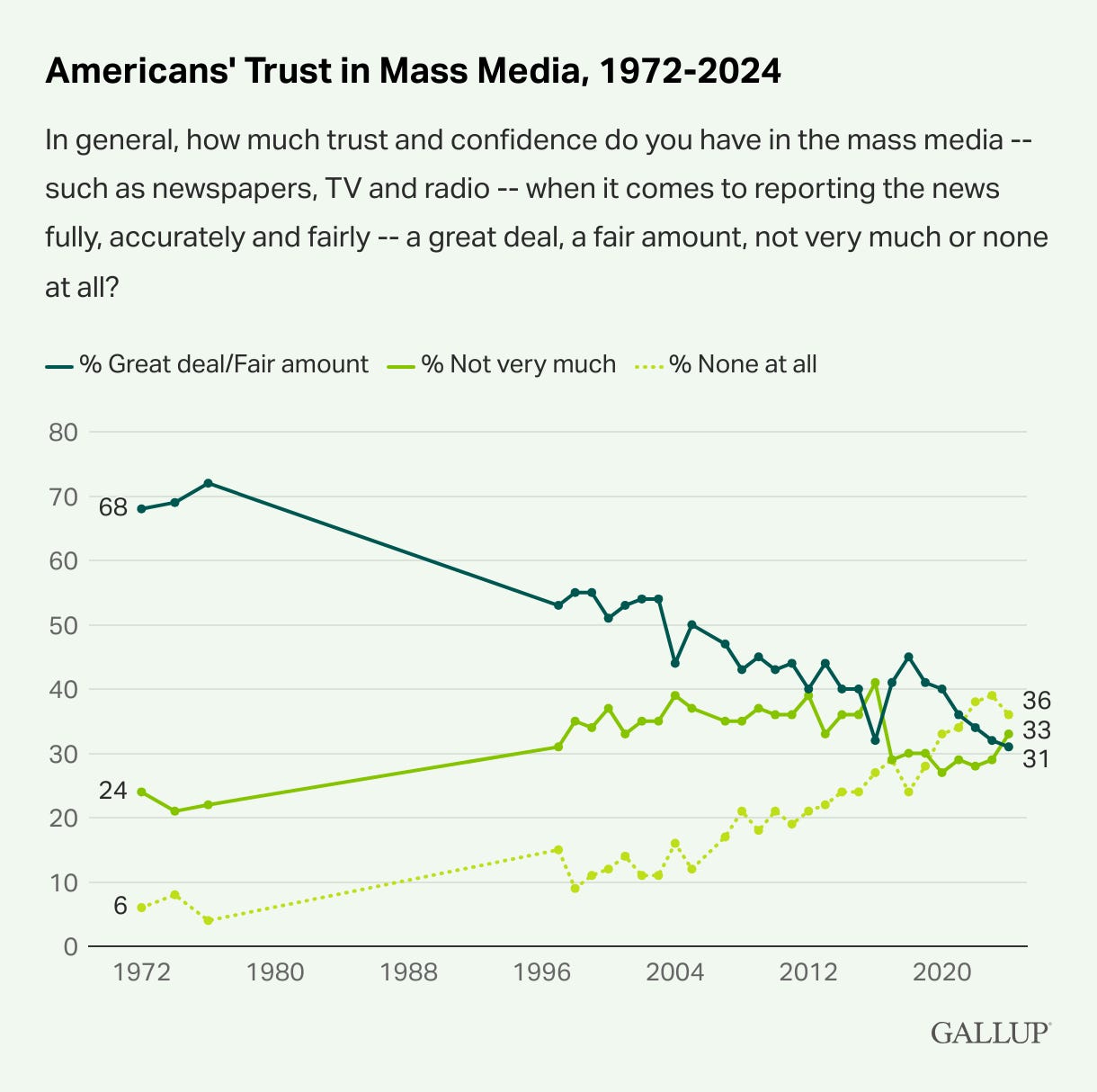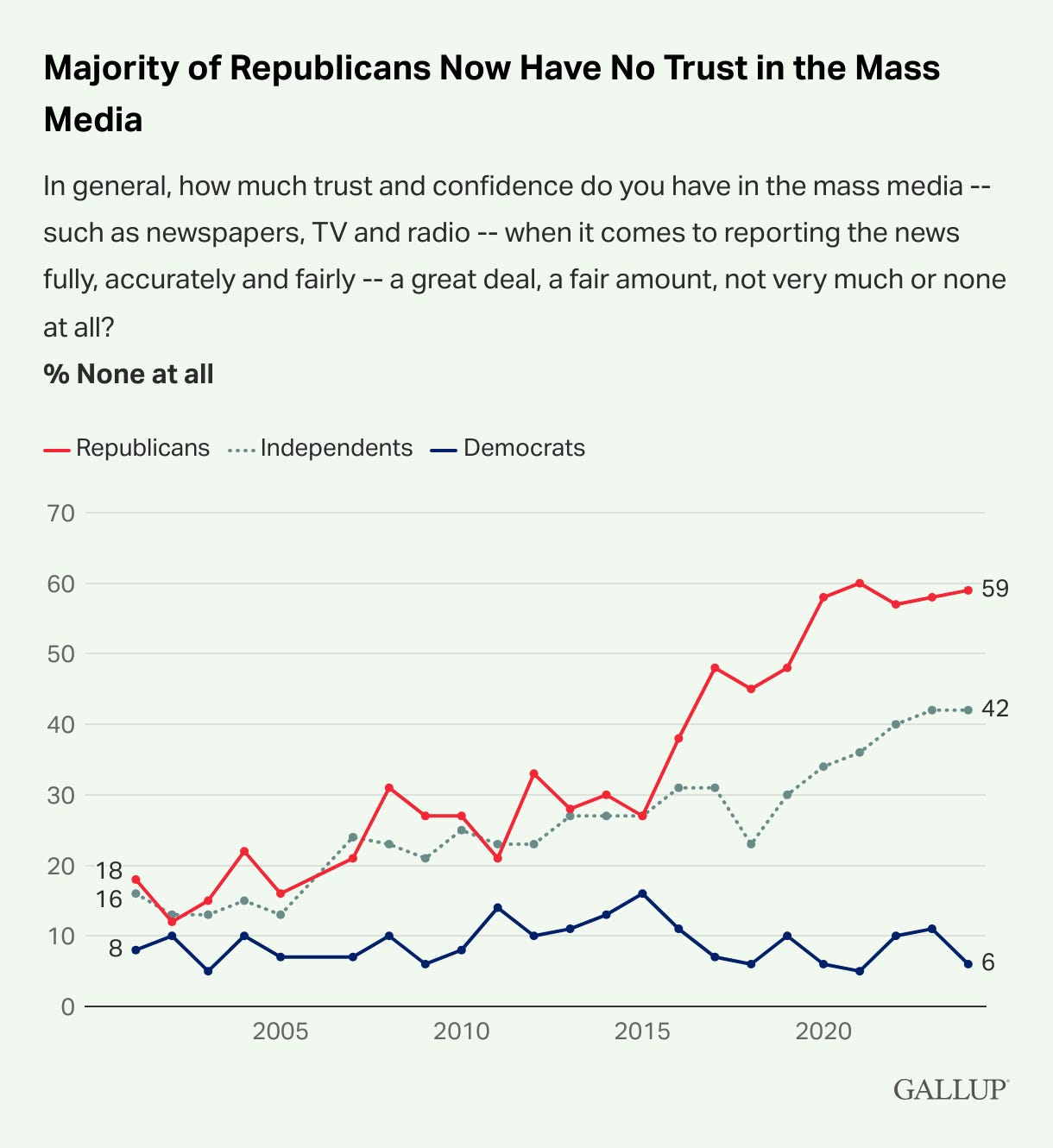Your accountant should always be a Republican. That was the advice JMM’s dad gave him when looking for a guy who could handle the complex taxes of a freelancer. And Accountant definitely fits the bill. A former farmer turned tax guru, Accountant is a hard R Republican, forged during the farm crisis of the Reagan years. He believes in honest work, small government, and maximizing JMM’s refund. And he has no qualms about sharing his opinion about anything.
On the election: “I blame the Democrats for Trump. They put up an awful candidate.”
On Gen Z: “They don’t know how to work.”
And on the media: “NBC, CBS, ABC, CNN, Fox—they all lie, every one of them.”
On that last one, Accountant is far from alone. Gallup just revisited some of its findings from last year’s poll on trust in media, drilling deep into the data to glean some insights on the future. It’s not pretty. Unsurprising, trust is media is on a downward slide. Over a third of the country (36%) is in Accountant’s camp, saying they have no confidence at all in America’s mass media, up from a low of 4% in 1975. And if you break it down by political affiliation, almost two-thirds of Republicans (59%) agree with Accountant’s take.
That’s not shocking—but not just for the reason you think. While Pres. Donald Trump has done plenty of damage to the media, from chirping constantly about fake news to recently promoting the internet’s worst propagandists to the White House press poll, there are plenty of other reasons for the crumbling of trust between the media and the audience it is supposed to serve. False narratives have flooded social media. AI slop is everywhere. And plenty of so-called news influencers will say anything to get a click. And like some of the falsehoods themselves, all that ill will makes its way from the fringes to more legitimate media. A 2017 study from Oxford’s Reuters Institute for the Study of Journalism summarizes what consumers think of the media now just as well as then: “Bias, Bullshit and Lies.”
But this is what caught JMM’s ear when sitting down with Accountant recently. He just wanted one place he could go to get real information. He, like a lot of folks, wishes he could trust what was on the TV or on the web—but he can’t. “You have to read all of them to figure out what’s really going on,” he said. “And even then, you can’t be sure.”
So, like any Boomer, Account has drifted towards authority figures. Those are the folks he and even Gen X’ers like JMM were told would be arbiters of truth. He talked about a recent article from Iowa’s junior senator Joni Ernst in the Wall Street Journal detailing all that’s wrong with the U.S. Agency for International Development (USAID) and a recent report she released about federal workers. Accountant said she had really done a good job of laying out why USAID should be shut down. He trusted her.
But the piece ran in the Opinions section for a reason. While Ernst did cite specific cases of questionable outcomes over the years in her OpEd, it turns out some of it was hyperbole. And that report he mentioned: it’s been fact-checked into oblivion, particularly around Ernst’s insistence that only 6% of federal workers came into the office each week. It only took ProPublica a two-minute walk-and-talk video to dismantled that notion, showing how an unscientific survey by Federal News Network, a site targeted at federal workers, somehow ended up in Ernst’s report as fact and then broadcast out as truth. So, ultimately, Account is being—again, unsurprisingly—lied to even there.
Which tracks with Gallup’s polling. The only group the American public has less confidence in than newspapers and television news is Congress. Guess we’ll all have a lot of work to do to build that trust back again.
And Now For Some Good News
Two years ago, Press Forward seemed like a nonprofit Spider-Man, swinging in to save local journalism in its hour of need. A coalition of 22 nonprofits including the Knight Foundation, the MacArthur Foundation, and Henry Luce Foundation, Press Forward promised to donate $500 million over five years to support local news initiatives. That’s a hell of a lot of cash, especially to an industry struggling against multiple challenges.
The goal of all that cash was to shore up some key areas. As JMM reported back in 2023, Press Forward wanted to strengthen local newsrooms, amplify environmental coverage, increase coverage of underserved and underrepresented communities, and bolster public policies that prop up local news coverage. The organization also planned to work with More Perfect, a bipartisan group focused on protecting democracy, to ensure the funds help keep citizens informed about what their government is doing.
Two weeks ago, right before the Knight Media Forum conference, Press Forward released an impact report. It’s impressive. The report claims the organization has already invested more than $200 million in local news initiatives. The funding went to outlets such as The Haitian Times, a news site focused on covering both the struggling country and the vast Haitian diaspora that found itself at the center of the 2024 election after some of its members were falsely accused of eating dogs in Springfield, Ohio. It also supported niche projects like Hola Carolina, a Spanish-language news site and radio station in North Carolina that kept folks informed when Hurricane Helene swept through the area.
Ultimately, the organization has helped fund $170 million in grants to news outlets across the country, from Maine to New Mexico. It supported 34 local chapters, which have, in turn, raised an additional $36 million for the organization. It even gives money to the University of Vermont’s Center for Community News, which taps j-schools across the country, including the Drake School of Journalism and Mass Communication, to cover local statehouse news that otherwise might go unreported.
Of course, the issues around local news are far from solved. That’s why Press Forward is continuing to expand its network of 88 donor organizations, including the Knight Foundation. And it’s why Knight is working with other groups such as the American Journalism Project to continue to expand local news coverage. Will it be enough to fill in all the local news gaps and news deserts that have emerged around the country? Hard to tell. But it’s certainly a great start.
Read of the Week
America might not be fighting with Denmark if it were more like Denmark. That’s the undercurrent of David Leonhardt’s ridiculously good New York Times piece “In an Age of Right-Wing Populism, Why Are Denmark’s Liberals Winning?”—though he never outright says it.
Instead, the piece is focused on how, as America and most of Europe have migrated toward Trump and Trump-like figures, the Social Democrats of Denmark have remained in power by leaning into a normally right-leaning issue: immigration. In this case, the center-left Social Democrats pivoted to strict immigration restrictions as a way to protect Denmark’s working class, preaching how unchecked immigration undercuts wages and services that many blue-collar Danes rely on.
But Leonhardt does more than just lay out Pres. Trump’s policy arguments in a more cogent and succinct way than Trump himself ever has. He explores the history of modern liberal thought, its connection to immigration in both the U.S. and Europe, and the influence of both on crime, public opinion, and the current political moment. And while the piece is long, clocking in at over 7,000 words, it’s an incredibly quick read for something so hefty. Better yet, it will leave you rethinking common assumptions regardless of your political leanings—which is exactly what good journalism should do.
Internships, Fellowships, and More
• JMM’s first official Fall 2025 internship. Penguin Random House is looking for several Fall 2025 interns. The positions are remote. There are openings in graphic design, editorial, publicity, sales, marketing and more. Regardless, you’ll get an inside look at book publishing. Positions last 10 weeks. You will need to be able to work 21 hours per week. Get all the info here. If you want to apply, the deadline to submit is March 17.
• The National Association of Science Writers is offering the NASW Diversity Summer Fellowship. Fellows receive $3,000 to complete a U.S.-based science communication internship during the summer of 2025. You also receive a one-year membership to the NASW. Click here for more info. Applications are due April 1.
• The Waterloo-Cedar Falls Courier is looking for a reporting intern. You’ll be embedded in the newsroom, working side-by-side with reporters and editors, covering the two of Iowa’s largest communities. Interns will be considered for full-time employment at the end of the 10-week program. The position is full time, though no specific pay is listed. The deadline to apply is March 15. Get all your info here, and apply using this link. You can also see all the internships available at some of the 77 newspapers Lee Enterprises, the parent company of the Waterloo-Cedar Falls Courier, also owns by going here.
• St. Cloud Live is looking for a summer news intern. The community news organization is focused on delivering local, community driven coverage. You can be a part of that, covering the city’s news and entertainment. You’ll work for 10 weeks, living in and covering St. Cloud. You must be at least a rising sophomore. Pay is $12-$13 per hour depending on experience. For more info and to apply, click here.
• Scientific American wants an extended newsletter and engagement intern. You’ll work with the editorial team to create engaging content that will highlight scientific discoveries, policy moves, technology advances, and more. The position is based in New York City. Pay is $20 an hour. You’ll work 35 hours a week for 5-6 months starting in June. Applications are due March 21. Apply here.
• Minions home Illumination is looking for multiple summer interns including a creative marketing and graphic design positions. The internships are designed for rising seniors. The gigs last eight weeks. The hybrid jobs do require you to be in the Santa Monica office several days a week. Pay is $17.28 an hour. Get the rundown here.
• The News Literacy Project needs a summer communications intern. The remote position’s requirements include being a “news junkie.” You’ll help conceptualize, develop and target campaigns, among other duties. You’ll work 25 hours week starting as early as May 12. Pay is $15-$17 an hour. The deadline to apply is March 24. Get all the details here.
• Slate needs a summer intern for its Advice section. Besides freely giving your opinion on things that aren’t really your business, you’ll support Slate’s flagship columns—Dear Prudence, Care and Feeding, Pay Dirt, How to Do It, and Good Job. The gig can be either based at Slate’s Brooklyn office or remote. It pays either minimum wage in your location or $16 an hour, whichever is greater. You’ll work full-time for 90 days starting in June. The deadline to apply is March 20. Get more info here.
• The American Prospect is looking for summer editorial interns that can create narrative interpretations of complex issues. Summer interns can be remote, hybrid, or based in Washington D.C. and work May through August. Full and part-time positions are available. Pay is $17.50. Deadline to apply is March 17. Get more info here.
• PR firm FleishmannHillard is looking for someone to fill a six-month hybrid internship in its Minneapolis office. You’ll work on brand/corporate positioning, media relations, social media, influencer marketing, content creation, and more. The full-time gig runs from June 25-Jan. 16, 2026. Pay is $18-$20 per hour. The deadline to apply is March 15. Get more info here.
• Texas Highways magazine is hiring a summer editorial intern. The Lone Star State’s official travel magazine, the award-winning pub covers everything Texas offers up. You’ll be a part of that, handing everything from fact-checking to social content creation. The gig is based in Austin. Pay is $18 an hour, and you’ll work a full 40-hour week. To be eligible you need to have over 60 college credits completed and working toward a degree in journalism, creative writing, or a related field. The deadline to apply is March 15. Get the full rundown here.
• The ad agency WorkInProgress is looking for summer Art and Copywriter interns. They’re the best paying internships JMM has ever seen. The gigs pay $50—yes, $50—an hour. You’ll work June-August, 40 hours a week, on actual campaigns for Domino’s, Sling TV, and more. The position is hybrid, requiring you to be in WIP’s Boulder, Colorado, offices every Tuesday and Thursday. Bonus: The job descriptions are actually really funny. Get all the info here.
• Her Campus is back, this time looking for a summer New & Politics Intern. You’ll be writing and editing timely news articles, working on larger editorial projects and packages, interviewing talent and expert sources, and more. You must be an undergrad and able to receive credit for the experience. The position is remote. Click here for more info.
• Apple Valley, Minnesota, needs a Video Content Creator intern for the summer. You’ll be creating social media videos for Apple Valley, Farmington, and Rosemount cities during this full-time internship. Editing software and graphics experience is also necessary. Pay range is a very specific $19.15-$21.70 per hour. The internship lasts 12 weeks with a flexible start date. Get more info and apply here.
• For even more internships and full-time gigs, check out MEO’s internship post on LinkedIn, which features 235 positions.
Got a Hot Tip?
Do you have some essential info or did you land your dream gig of being a Red Bull field marketing specialist—and get access to the Red Bill Mini Cooper—like Madissen Kerman (DMP, Psych, ’24)? If so, then let JMM know by sending that juicy news on over to jeff.inman@drake.edu. JMM will treat it like these photos from Tricia Richards (Mags, DMP, ’22), who is obviously living her best life as a licensing business development manager for Neopets, tell everyone about it.
Finally, you think your mom is embarrassing?






A service called Citizen Portal offers AI summaries of public meetings, with links to comments in the video. This might be a source your Accountant could use to start with information. Though I find it tends towards glossing over issues and relying too much on what officials are saying. What's definitely missing is a fact check to what's being said in public meetings. So AI could very easily propagate lies that way. It's a double edge sword of info vs analysis.